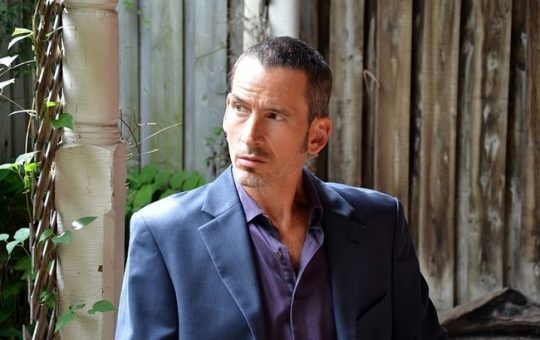In The Nightingale Won’t Let You Sleep, Heighton mashes up the best parts of the geo-political thriller, the historical narrative, an in-depth character study, lashing all these elements together with lyric prose and breathtaking design. — Richard Farrell
The Nightingale Won’t Let You Sleep
Steven Heighton
PenguinUSA, 2017
352 pages, $18.00
.
We are a species hellbent on escaping circumstance, deterministic nomads, forever obedient to the belief that ‘better’ exists ‘elsewhere.’ Utopian societies hold a special appeal in literature. From Eden to Plato’s Republic to Swift’s Lilliput, the allure of alternate reality has long captured the imagination of writers and readers alike. And while post-modern versions tend toward the dystopian—one thinks of Orwell, Huxley, and later Cormac McCarthy and Margaret Atwood—the temptation to enter other worlds remains just as strong.
Steven Heighton’s latest novel, The Nightingale Won’t Let You Sleep, takes place in the war-ravaged ruins of a Mediterranean ghost town, effectively blending utopian elements into a dystopian village. On the politically divided island of Cyprus, lies Varosha. Once a thriving Riviera resort, this now-shuttered city on the U.N. Green Line was abandoned in the aftermath of the 1974 fighting between Greece and Turkey. Some 20,000 citizens of Varosha fled the bombs, leaving behind parked cars, tables at sidewalk cafés, and shops still filled with clothing.
Block by block Varosha too seems more unreal, if increasingly visible. The moon has risen behind him, over the sea, and though not yet clear of the beachfront towers, it lends an indirect glow. Where vines and creepers have not engulfed the signage he can read the names of businesses, in Greek, English, both—a bakery, a steam laundry, a small nightclub, a café whose heavy tables still line the street although the chairs have vanished—and he can tell the makes of the occasional cars melting into the pavement.
Inside Varosha, however, a hidden community survives. Heighton’s ragtag band of misfits, idealists, exiles, and castoffs have built a secret but sustainable commerce-free zone, where orchards of almond, cherry, and pistachio trees thrive in the Mediterranean sunshine. Snare traps catch rabbits, fig trees drop fruit, and what the village cannot produce, they trade for with the friendly Turkish officer in charge of an adjacent military outpost.
Into this secret world stumbles the battle-weary, Greek-Canadian solider, Elias Trifannis. Dispatched to Cyprus for R&R, Elias is haunted by battlefield nightmares. While drinking in a bar, he meets Eylül Sahin, a beautiful Turkish journalist. The two talk, flirt, and fend off hostile attention from a group of Turkish soldiers. Later, after an amorous coupling on the beach (a sex scene replete with turtle hatchlings scurrying seaward in starlight) those same soldiers reappear, drunker, angrier, and armed. Shots are fired. Eylül falls in the crossfire. Thinking she’s dead, Elias—injured and dazed himself—escapes through a hole in the fence, and slips into the hidden world of Varosha.
Outside the fence, an investigation begins. With a Turkish journalist shot, a Greek-Canadian solider missing, and a tenuous peace between rival nations in the balance, the political ramifications of the incident reverberate far and wide. Before lapsing into a coma, the gravely wounded Eylül overhears her attackers hastily concoct a cover story: “The Greek attacked her, we tried to help, the Greek attacked me, you tried to shoot him, you hit her. Simple enough?”
The next morning, these events are reported to the commanding officer of the adjacent, Turkish military garrison. Colonel Erkan Kaya immediately doubts his soldiers’ tale, but also knows “this was a story that would have to disappear.” Suspecting that Elias may have escaped into Varosha, Kaya wants no part of an on-going investigation that could topple his cushy command. “Things right themselves—they always do,” is more than just Kaya’s motto, it is the man’s pervasive ethos. He declares Elias dead, tosses his phone into the water, and reports that the man’s body washed out to sea.
Kaya is a remarkable construct of Heighton’s imagination. The colonel is so likable, so enigmatically decent, that you root for him despite his bumbling attempts to keep secrets. A military officer cut from the mold of Jeff Lebowski rather than Rambo, Kaya’s idyllic life mirrors that of the Varoshans. He lounges at the officers’ club, beds exotic women, and quaffs on mouthwatering lunches of figs, olives, lamb, and raki. His primary struggle is not war, but a stalwart defense of the status quo.
In a sense, two idealistic worlds exist, one inside Varosha, and one at Kaya’s officers’ club. But reality constantly encroaches, and in Heighton’s world, that reality has a name: Captain Polat.
If good stories work through compelling opposition, then Kaya and Polat are wonderfully paired opponents. From the moment he first appears, in a wonderfully taut, almost comedic tennis match, Polat seems determined to defy his boss. Where Kaya is a gentleman of leisure, Polat exemplifies the ambitious, career-minded soldier. Suspecting Elias has slipped away, the young adjutant wants to enter Varosha and unearth its secrets. “Allow me to lead a—sir, I would be honoured to lead a platoon in there—immediately.”
Meanwhile, inside Varosha, Elias recovers from his wounds and two perilous escape attempts that set back his recovery. Part prisoner, part refugee, Elias struggles with his fate. Should he remain in this village, free from the demands of commerce, war, and corruption? Or should he escape, fulfil his duty, and tell the truth about what happened?
In some ways he will be almost sorry to leave. This pocket in the ruins of a dead city seems more like a singularity outside of time, so that past events out there beyond the mouth of the wormhole are coming to feel, by light of day, like hallucinations. Another few months and they might seem to belong in the bio or obituary of a stranger—though by then he will be back out there and dealing with the fallout of the real events.
Heighton’s spellbinding world is under constant threat. The inhabitants are aging. Even the most recalcitrant villagers recognize the half-life of their exile. And the longer Elias remains, the more entangled he becomes in the lives of these villagers. What happens if the obsessed Polat returns? What happens when Kaya is eventually transferred? Though Varosha has existed for more than 40 years, it is a world on the edge.
Months pass. A love affair develops between Elias and Kaiti, the mother of twins, who is poised to abandon the village. Kaya transfers Polat to combat duty in Syria, where he becomes a combat hero. Elias attempts to escape again, and nearly drowns. Kaya’s children visit Cyprus, and his teenage son develops a fixation on weapons and exploring Varosha. Kaiti gets pregnant. And then Polat returns, even more singularly obsessed with searching the village and unlocking its secrets.
§
War and its horrors tremble at the margins of this story, in Elias’s memories of a grisly raid in Afghanistan, in the escalation of fighting between the Turks and the Syrians, and in the tension of soldiers willing to kill simply because the guy in the bar wears the wrong uniform. Heighton mostly keeps combat off-stage, but it haunts, a constant bell that chimes. Contemporary violence accretes atop ancient scars, the way wars always must.
Again and again, Heighton doubles his themes, uncovers linkages between his imagery, loops back on history and story. War and peace. Love and loss. Home and exile. Freedom and servitude. On both a macro and micro level, parallel patterns abound, creating wonderful paradoxes, rich layers of detail, and story puzzles to delight.
Heighton delivers another stunner in this his 15th book, and fourth novel. Winner of the 2016 Governor-General Prize for Poetry (The Waking Comes Late) Heighton has never shied away from formidable themes or complex plots. In The Nightingale Won’t Let You Sleep, Heighton mashes up the best parts of the geo-political thriller, the historical narrative, an in-depth character study, lashing all these elements together with lyric prose and breathtaking design. I found myself thinking of Robert Stone’s Damascus Gate, Shirley Hazard’s The Great Fire, and John Fowles’ The Magus.
In fact, Heighton has always reminded me a bit of John Fowles. Both writers are serious craftsmen and rigorous thinkers, with a profound respect for history, nature, and culture. Both populate their stories with strange but fully rendered characters. And both men dazzle their readers with depictions of mesmerizing worlds, elegant storylines, and serious themes. And like Fowles, Heighton is a writer who interrogates notions of reality, examining the borderlands between commerce and community, between mere existence and a deeper, sacred sense of being.
In his compact but brilliant book of writing advice, Work Book: Memos & Dispatches on Writing, Heighton describes the act of reading this way:
Vertical resonance means a downward echoing, the potential for soundings into a textual subconscious, the swimmer’s thrilling sense, when crossing a mountain lake, of unmeasured depths in the dark below the thermocline.
The Nightingale Won’t Let You Sleep is an invigorating swim into such unmeasured depths.
—Richard Farrell
N5


